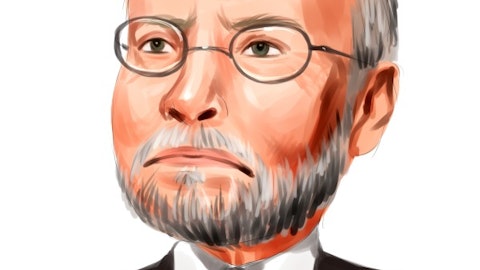The labor market is schizophrenic. And so I think that is having some impact and probably more impact than we thought coming into the beginning of the year. We sort of expected some weren’t sure how much, but I think, with a lot of the year now in hindsight, I would say that there’s probably been more than we expected. And so being at the low end of our mid single-digit range is partly a reflection of that. With that said, we’re still growing enterprise 10%, 15% a year. So it continues to be a very healthy business for us and we expect that to be the case going forward. With respect to our relationship with Windstream, I’ve always said – I think it’s better than the market actually thinks it is. And that continues to be the case. We wish Tony well and his next endeavor and we’re very pleased to see Paul in that role.
He’s an industry veteran and he’s frankly, a long time friend too. So we look forward to working with him going forward.
David Barden: Thanks, Kenny.
Kenny Gunderman: Thank you.
Operator: Thank you. Our next question or comment comes from the line of Bora Lee from RBC Capital Markets. Mr. Lee, your line is now open.
Bora Lee: Thanks, and good morning. Just referring back to your comment about customers understanding that higher costs, does that provide any opportunity to move on pricing at all from your standpoint? And then secondly, could you remind us if there are any opportunities for you utilizing federal programs such as the middle mile program or others?
Kenny Gunderman: Hey, Bora. Yes, I think the short answer to your first question is yes, it does. I think specifically when we’re engaging with wholesale customers, because a lot of these big network deals are almost by definition, they’re bespoke and they require a lot of – they have a lot of moving pieces. There’s an NRC component, there’s a MRC component, there’s potentially escalators and among other things, right? There’s six or 10 different moving pieces. But net-net, when you look at return thresholds for us, we absolutely have been in incorporating a higher cost of capital into those return thresholds. And we’ve been including that for some time now. And I think on a go forward basis, that’s not going to change anytime soon.
It may even go higher, frankly. And so when we set those hurdles for ourselves, for our team by definition, that leads to higher NRCs or that leads to higher MRCs and so forth. And so ultimately, what we’re finding is that customers are understanding of that and that we’re getting – we’re still getting deals done. I think on the enterprise side, it’s a little different. You don’t just change pricing on a regular basis. You got to be a little more disciplined and conscientious about making changes there. We’re actually in the process of refreshing and thinking on that. I think there might be some changes around that going into next year, but we really haven’t made any material changes there this year. We’ve actually asked ourselves, if we were to make changes, how much impact would that have on-demand, either positively or negatively.
But we’re kind of going through that analysis, but haven’t really made any changes in that regard. I’m sorry, what was the second… Yes, we’re definitely – we consistently look at both federal and state funding. Bora always looking at it from the standpoint of how we can use it not only for ourselves, but also how our customers might use it. We definitely have a large number of customers who are benefiting from the federal and state funding for fiber-to-the-home. And I think as we’ve talked about, we’re a beneficiary of that by extension. For ourselves, we are actually looking at some middle mile opportunities that in the past we’ve always concluded did not make sense for us for a variety of reasons. But we’re currently looking at some that we think could and I won’t go through all the reasons why.
But in general, it needs to be – the funding needs to be in a territory and as part of a network that we think is strategic as opposed to just building it because you can get the money. And so if we can do it in a way that actually adds to the overall strategic value of our network, it’s something that we think is worth it and it’s worth spending our time and resources on. So probably more to come on that.
Bora Lee: Got it. Just a couple of follow-up actually, on the pricing side, is that to maintain the spread between return and cost of capital or reduce compression or expand? And then on the middle mile, would you consider as doing that with a partner of some sort an option as well that you’ve been thinking about?
Kenny Gunderman: Yes. So definitely – on your first question, yes, it’s maintaining that margin between cost and return. And we look at returns in a lot of different ways. We look at payback, we look at immediate cash flow yield, we look at IRR among others. And so yes, we’re using the cost of capital as a baseline cost. And then we’re hurdling those that cost in order to get returns that are attractive for our shareholders. And we talked about this before, but we’re generally looking for 10% plus yields on a well, sorry, five to 10 builds with an immediate clear line of sight to 10% plus lease-up yields. And we certainly look for IRRs in the double-digit range as well. And yes, we’re always looking, not we’re consistently looking for partners to build network, whether it be with subsidies or not.
And back to the question about AI, I think one of the big opportunities there is building network in partnership with some of the hyperscalers where they’re bringing a big NRC or upfront fiber commitment to the table to help justify the investment by us. And that’s really sort of a core part of our wireless strategy. I mean, that’s really what we’ve done historically with the wireless carriers where they – they need a greenfield build and they’re the anchor customer to help finance the network for us, where we take the risk on lease-up. So that’s really a core part of our business. And adding – the added benefit of state or federal subsidies and partnering there is absolutely something that we’re looking at.
Bora Lee: And sorry to ask, but you cut out for a brief second when you were making your comments on the returns. Would you just mind repeating just the first couple of seconds there?


